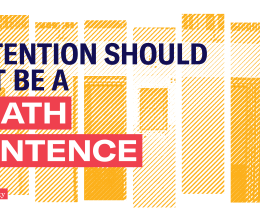A magnet that hangs on my refrigerator is resonating in new ways as we fight the novel coronavirus throughout the Commonwealth. The magnet has a quote from Bryan Stevenson: “The true measure of our character is how we treat the poor, the disfavored, the accused, the incarcerated, and the condemned.” Kentuckians who live and work in correctional facilities and detention centers are uniquely vulnerable during this crisis and they deserve unique and aggressive interventions to stay safe. While state and local officials have taken some steps to limit the spread of the virus, their efforts have been too slow and few in number to ensure the health and safety of people in these facilities.
The shocking scope of the crisis was revealed this week when the governor released testing information from Green River Correctional Complex. Testing uncovered 339 incarcerated people and 50 staff members infected with COVID-19. At the time of this writing, two incarcerated people died as a direct result of the disease, while a third is still under investigation. What little attention these deaths have received in media coverage has focused on the individuals’ legal records. No matter their past, these Kentuckians had family members and friends that loved them and are grieving their passing. These men were sent to Green River with sentences to serve, and then they were supposed to return to their families and communities, like the vast majority of incarcerated Kentuckians. Instead, COVID-19 turned their sentences into death sentences.
A few hundred Kentuckians have been released early or have had their sentences commuted. However, thousands more – including hundreds who simply lack proper immigration documentation – are being detained in jails, prisons, and detention centers throughout the Commonwealth. Black and Brown people are overrepresented in these facilities because of long-entrenched racial bias in the criminal legal system. (Outside of the system, Black people are dying at much higher rates of COVID-19 in Kentucky and nationally.)
Detention facilities are crowded and make social distancing impossible. They are petri dishes for disease because people are forced to share small cells and communal sleeping spaces. Many of these people don’t have regular access to soap. We learned of one cell that was designed for 16 people but is holding 21. Making matters worse, there are only two bars of soap that all 21 people must share. Due to restrictions on alcohol in correctional facilities, most don’t have access to effective hand sanitizers either. Shared items and spaces, like tables, chairs, toilets, and showers, are not sanitized after every use. Under these conditions, it is no wonder that fear and anxiety are at all-time highs in these facilities. Heartbreaking pictures have emerged from Green River of people holding signs that say, “Please Governor Beshear, don’t let me die here at Green River of COVID-19.”
Green River Correctional Complex has received the most attention because of the outbreak there. Unfortunately, the problem may be more widespread than we are currently aware of because there is no widespread testing in Kentucky’s correctional system. The same is true for federal facilities, with a recently announced major outbreak at Federal Medical Center in Lexington becoming the city’s first. While the Department of Corrections lists data on its website showing facilities with zero COVID-19 cases, this is often because there has been no testing at those facilities. The state must implement widespread testing, so they and the public have a full picture of this crisis.
Advocates have been pressuring the governor, police, prosecutors, the parole board, ICE officials, sheriffs, and judges to reduce incarcerated populations. This call has come from a wide range of groups, including the ACLU of Kentucky, Kentucky’s Department of Public Advocacy, and advocates from The Bail Project, Louisville Showing Up For Racial Justice, the Freedom Fridays movement, and many others. To date, hundreds of people are out of harm’s way because of this work. That’s progress but it’s not enough. We need to safely release thousands more to save the lives of incarcerated people, corrections employees, and the communities those employees call home. As members of Team Kentucky, we must all work to make sure that these returning Kentuckians have the supports they need, not only to survive the pandemic, but to thrive in community.
